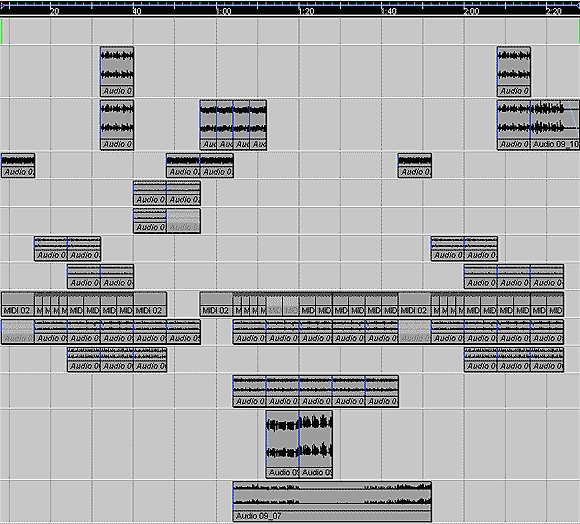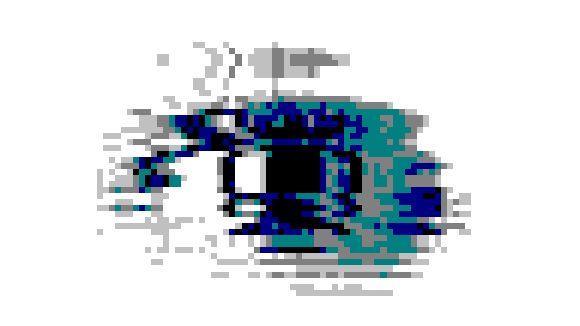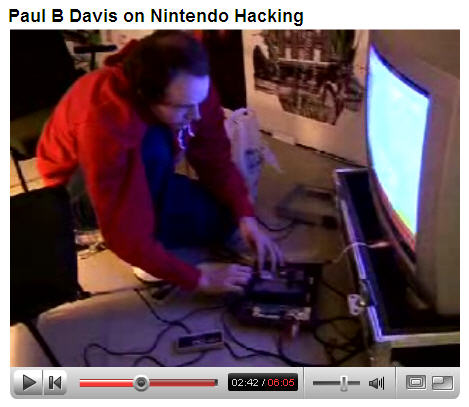View current page
...more recent posts
In August I did a post about the interesting cross-disciplinary issues that come up when critical-minded folks from the club music scene describe academic electronic music with their own carefully honed vocabularies and sensibilities. Another good example comes, of course, from electronic dance/post-punk specialist Simon Reynolds, in this respectfully irreverent paragraph I just found on his blog:
Along with its relative affordability, one of the things I like about the second-division electronic avant-classical is its generic-ness. I mean that most sincerely folks. There's two facets to this 1/ if it’s a genre you love (say, ardkore, or freakbeat/garage punk, or dub, or whatever) then the genre-icity is no problemo, in fact the more fiercely it is itself, rather than dabbling outside its own parameters, than the better really; plus you have such an appetite for the stuff in question that you crave the second or even third-division material. But also 2/ there's this extra element of pathos and even a tiny hint of comedy too. See, here’s these guys who thought they were opening up infinite vistas and spectra of sound, boldly going where no composer's gone, building the future, etc. Yet a lot of it does tend to sound a bit samey. Partly because they only had a few different instruments at this point to grapple with: the Buchla, the Moog, a few other machines. But also beca[us]e a certain lexicon of sounds and FX got established that people tended to go for. In fact if I have some time at some point I’d like to do a taxonomy of those 12 or 16 or 23 noises/devices/effects, 'cos they do tend to crop up rather frequently. The other reason the avant-electronic stuff can sound generic is that the composers tended to use the machines as tools for extending their pre-electronic ideas, rather than search for the absolute idiomatic thing the machine could do. So there’s a lot of post-serialist approaches being transposed to synthesiser, I reckon. Which is why you get that feeling of clutter and twitter, flurries of note-runs and clusters, a fidgety fraugh[t]ness. There's also that atmosphere of disquiet that's very post-War existen[t]ialist-modernist-neurotic, kinda highly-strung and almost hands-wringingly anguished at times. But I suppose this makes perfect sense, was inevitable: composers who studied theory and went through conservatory training and all that, who have followed the grand narrative of western musical thought all the way through to the present juncture, or their own personal version of that arc/dialectic/whatever--they're not going to suddenly junk all their ideas and concepts and nous and technique, and just lay themselves open to the potentialities of the machinery, in a state of mind-voided open-ness and zero preconceptions. They’re going to dictate to the technology rather than the other way round. But that explains why a lot of the avant-electronic music sounds like 20th Century classical, as opposed to utterly alien and foreign, which you get more with your rock people perhaps, who lack the composerly grounding and also have more of a cheap thrills/gimmicky slanted approach to new tech.

Kristin Lucas, Happy and Sad Sack Lunch Series 2005. (Detail above.)
More from her archive.
"Sawtooth Junction" [mp3 removed]
This is kind of a happy song, incorporating folk, classical, and techno-rave influences into a single perky package. Within my tiny little corner of the home-producer sphere, I do have ambitions. I'm starting to get a method down of playing* and recording blocks of notes, using those blocks to write harmonically and timbrally compatible new blocks, then shuffling everything around with an eye to song development or at least some unfolding surprises. Each recorded block is a gestalt or hybrid of a particular type of (synthesized, filtered) sound with a particular sequence of notes. A block could be a melody or a rhythm. Obviously the design of the sequencer/recorder shapes and encourages this composition method, just as I'm sure a harpsichord and musical staff paper bred its own type of music. I know others put a lot of effort into making "natural"-sounding transitions between measures but I Iike a certain music box artificiality in the sound.
*By playing I mean writing notes, programming the synths and filters, and letting the sequencer play the sounds. I'm into "post-hand" music in a way I'm not with art, entirely, yet.
Updated with minor edits: reduced the volume on one of the hi-hat tracks; fixed a couple of glitches.

Matt Stoller of MyDD has been following the Connecticut senate race, as a Ned Lamont supporter, in the aftermath of the primary when Lamont whupped the odious Joe Lieberman. It's not looking too good--polls show Lieberman, now running as an indie, ahead. Stoller says this:
I've developed a keen respect for Senator Lieberman over the past few months. The man is completely brilliant, probably the best politician I've ever seen up close. When he wants something, he goes and gets it. He's not just a great politician, he's an extremely skilled sociopathic charmer, able to appeal to one's worst instincts while making you feel like he's helping create resolute moral tone. Lieberman is the consummate small state politician; he has the press here wrapped around his finger, and he is able to create an aura of trust and geniality wherever he goes, even as he calls for regime change in Iran and sends his voters' children to be maimed for his own pride. It's a stunning feat. So the challenge is great, and it's not supposed to be easy, because convincing the public that they have been voting for a psychotic man divorced from the consequences of his brutal actions is really tough when that creepy package is delivered in a Happy Meal.I believe Stoller is learning on the job that Holy Joe is a "consummate small state politician." The progressive narrative during the primary fight was that Lieberman had "gone Washington" and lost touch with his constituents.

In "How to Make a Power Grab Mundane," in Editor and Publisher, James Bovard nails the bland language the Washington Post used to describe the enactment of the Bush/McCain torture law:
The Military Commissions Act is widely seen as legalizing torture, but the article avoids any such mention of the T-word. Though the act revolutionizes American jurisprudence by permitting the use of tortured confessions in judicial proceedings, the Post discreetly notes only that defendants will face “restrictions on their ability to ... exclude evidence gained through witness coercion.”Court challenges to this horrible law will need to be robust and unceasing. Let's hope the civil rights bar is up to the job, since we obviously can't count on newspapers to protest the dismantling of Constitutional protections of freedom and individual rights.
The lead of the Post article declares that the new law will “set the rules for the trials of key al-Qaeda members.” A typical subway strap hanger reader might shrug at this point and shift to the Sports section to read the latest autopsy on the Washington Redskins. The Post neglects to mention that the bill codifies the president’s power to label anyone on Earth an “enemy combatant” -- based on secret evidence which the government need not disclose.
Almost let Brian De Palma's The Black Dahlia slip out of the threatres, noting the so-so reviews, and then remembered, with a forehead slap, he always get bad reviews--until 5, 10, 20 years later, then everyone loves his work.
It's awesome. Yeah, yeah, Josh Hartnett and Scarlett Johansson are wooden, so what? You don't go to this man's films for the acting--it's adequate. With De Palma it's the architecture, the slithery camera unhinged from narrative (or so we think until it reveals something important), the overwhelming sense of place, the visual clues and puns, the high camp melodrama, the intricately worked out geometry of every scene. The shot of the creepy slum houses under the "Hollywoodland" sign alone brings James Ellroy to life, but the "discovery of the body" scene takes his tawdry view of tinseltown to a whole other macabre level. The movie is shot on digital video but it feels big screen ambitious.
Go, go tomorrow. Be sure to look for Mia Kirshner as the Dahlia--she played "the babysitter" in Atom Egoyan's Exotica and seems forever on the verge of a major career. May she be another Jennifer Connelly blessed with a "late break." She's really good.

YouTube: "Produced by Hit 'n' Run [for Dutch television], this interview took place with Paul B. Davis from the BEIGE collective at the 35th International Film Festival Rotterdam. Paul exhibited a piece at the exhibition 'Satellite of Love' produced by Exploding Television. Here he talks about his Nintendo Cartridge Hacking."
Davis' delivery is very dry and funny in this video, and he has some great things to say. He and fellow artist Cory Arcangel, through their work with the BEIGE collective, have both been active proponents of busting open game cartridges and reprogramming the chips (though perhaps in a less aggressively activist way today than a few years ago--but that's another post). While gaygamer.net calls Mary Flanagan the "secret heart" of the movie 8 BIT, I don't really agree with that. (As mentioned earlier, Kristin Lucas's work would have been a catchier example in the film to show the psychological effects of life in a high-speed technological world--her late '90s videos incorporating game and sci-fi tropes are at once disturbing, aesthetically engaging, "lo fi," and presaged many themes of what might now be called the 8 BIT movement.)
No, if the movie has a secret heart, it's why Arcangel and Davis, who used the phrase "8 Bit" in an LP title five years ago and are sort of the poster children for the current scene, started hacking Nintendo cartridges in the first place. Davis was always the more political of the pair in how he speaks about it, but he makes an interesting point in this YouTube vid: that untapped aesthetic potential exists in everyday gear that is meant to be inaccessible to us. As he describes it, the "cheapest, highest quality audio and video generation system you could get" is locked up in a proprietary system that mostly sits in your closet. Although its hardware and software constitute a complete or "general purpose" computer, it only does one thing, which is play this one particular brand of game.
This is what I would call the "ecological" argument--a wry complaint addressed to the consumerist waste that is the bedrock of our capitalist system and represents a condition that simply will not go on forever, as resources dry up and the planet turns into a sewer. To some extent the 8-bit scene gives a glimpse of artists we will have after the Fall: patterned on archetypes like Gilligan's Island's Professor or Escape from New York's Brain, they will squeeze "energy dependent culture" out of a diminishing stock of manufactured products. Yet the BEIGE crew is doing it now, while we're still awash in plentiful, working consumer electronics. Their suggestion that "anyone can hack cartridges" also recalls Robert Pirsig's '70s self help book Zen and the Art of Motorcycle Maintenance, which argued for people taking back some control in their technologically dependent lives. Of course, the BEIGE work is goofy and fun, too--it's not as Earth First!-y or New Age as I'm making it sound. Here is an excerpt from an early manifesto, written by Davis; it would have been nice to hear more of this in 8 BIT:
Bereft of a veneer, interaction with such complicated machinery requires a significant amount of technological knowledge and awareness. In this spirit, "Fat Bits" represents a step towards what Cory and I describe as "Post-Data". We create computer art which is aesthetically aware of both its own identity and the underlying process which supports it - that is to say it recognizes the fundamental prototype of the "computer", and not the "software", as the tool and medium. The content for "Fat Bits", video of a NHL hockey fight, was chosen because the close-up nature of its imagery makes for convenient replication on low-resolution systems such as the Nintendo Entertainment System. The use of the Nintendo Entertainment System is itself important because it, firstly, signifies an artistic "re-licensing" of proprietary corporate technology and, secondly, refutes Nintendo's forced obsolescence profit structure which defines it as "outdated" (the Nintendo Entertainment System was introduced to the US home video game market in 1986). Our primary foundation of Post Data is then this: the conscious corruption of data, the releasing of bits from their imprisonment within the restrictive, limiting boundaries of corporate software applications, and the exploitation of the extreme complexity of computer systems paired with the extreme intentionality of artist(s) who seek to engage the computing process at a fundamental level.
